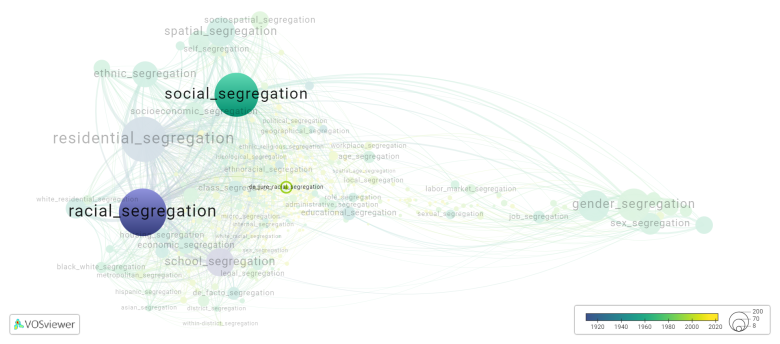De jure racial segregation
Date and country of first publication[1][edit | edit source]
2005
United States
Definition[edit | edit source]
De jure racial segregation refers to the legally enforced separation of different racial or ethnic groups in society. This type of segregation is codified in laws and regulations that explicitly dictate where people of different races can live, work, attend school, and socialize. De jure racial segregation was prevalent in the United States prior to the Civil Rights Movement, with laws such as Jim Crow laws mandating separate facilities for white and black people. This system of segregation was eventually declared unconstitutional by the Supreme Court in landmark cases such as Brown v. Board of Education.
See also[edit | edit source]
Related segregation forms[edit | edit source]
De jure racial segregation is frequently discussed in the literature with the following segregation forms:
social segregation, racial segregation

This visualization is based on the study The Multidisciplinary Landscape of Segregation Research.
For the complete network of interrelated segregation forms, please refer to:
References[edit | edit source]
Notes[edit | edit source]
- ↑ Date and country of first publication as informed by the Scopus database (December 2023).
At its current state, this definition has been generated by a Large Language Model (LLM) so far without review by an independent researcher or a member of the curating team of segregation experts that keep the Segregation Wiki online. While we strive for accuracy, we cannot guarantee its reliability, completeness and timeliness. Please use this content with caution and verify information as needed. Also, feel free to improve on the definition as you see fit, including the use of references and other informational resources. We value your input in enhancing the quality and accuracy of the definitions of segregation forms collectively offered in the Segregation Wiki ©.
De jure racial segregation appears in the following literature[edit | edit source]
Boxill B.R. (2005). Black liberation Yes!. The Liberation Debate: Rights at Issue, 49-63. Taylor and Francis.https://doi.org/10.4324/9780203976692-13
Dubey M., Goldberg E.S. (2011). New frontiers, cross currents and convergences: Emerging cultural paradigms. The Cambridge History of African American Literature, 566-618. Cambridge University Press.https://doi.org/10.1017/CHOL9780511780967.025
Höhn M. (2011). Love across the color line the limits of German and American Democracy, 1945 1968. Germans and African Americans: Two Centuries of Exchange, 105-125. University Press of Mississippi.https://doi.org/
Dixson A.D. (2011). Democracy now? Race, education, and black self determination. Teachers College Record, 113(4), 811-830. Teachers College, Columbia University.https://doi.org/
Kennedy R.L. (2014). Ackerman's brown. Yale Law Journal, 123(8), 3064-3075. Yale Law Journal.https://doi.org/
Clanton G. (2019). A white memoir of the american apartheid: Lest we forget. Studies in Symbolic Interaction, 50(), 171-180. Emerald Group Publishing Ltd..https://doi.org/10.1108/S0163-239620190000050008
